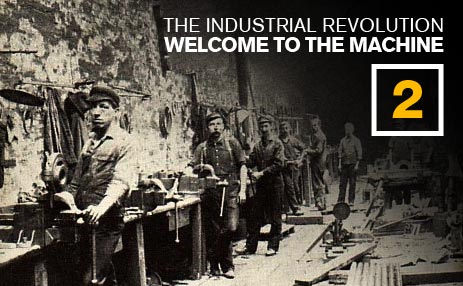Latest
-
Objections to the Christian Faith from the Unchurched and De-Churched
 Tue Dec 02, 2014
Tue Dec 02, 2014
by Resurgence -
Craig Groeschel: We Innovate for Jesus
 Tue Oct 14, 2014
Tue Oct 14, 2014
by Resurgence -
Mark Driscoll: Revelation
 Tue Oct 07, 2014
Tue Oct 07, 2014
by Resurgence -
RESURGENCE LEADERSHIP #034: JOHN PIPER, WHY I TRUST THE SCRIPTURES, PART 2
 Tue Sep 30, 2014
Tue Sep 30, 2014
by Resurgence -
Resurgence Leadership #033: John Piper, Why I Trust the Scriptures, Part 1
 Tue Sep 23, 2014
Tue Sep 23, 2014
by Resurgence

Archives
The Industrial Revolution: Welcome to the Machine, Part 2

In The Flesh
The future of the Industrial Revolution, fueled by assembly lines, combustion engines, and steel, was one side of the spectrum that called for the church to incarnate. It did what it has always done: it brought eternal truth to time. The Incarnation of Christ, best described in John 1:14, is that the Word became flesh and tabernacled among us, and was full of truth and grace. God's perfect grace and unfailing and permanent truth never changed. These were both present before the Incarnation, and were true and understandable through the Incarnation. What changed was that he tabernacled among us. We now understood Jesus to be the image, or in Greek the icon, of God. Just as on a computer we have an icon that, when opened or exposed, reveals lines of code that produce for us all the information stored within that icon, so now this was with Jesus of Nazareth. In him dwelt all the fullness that God had bottled. Jesus tabernacled in culture. He normatively existed within the words, cues, and artifacts exchanged by Palestinian people of his day. He was a carpenter and was understood as such. He was a Jew, and this was recognized mutually by Jews and Gentiles alike. He was native. He was organic. He was incarnate.
Incarnation in Culture
For Jesus to come as anything else would be like watching a badly synchronized film. His words wouldn't have matched. He wouldn't have been understood. He didn't wear a business suit, nor did he speak Chinese. He was Palestinian, speaking the language. The church, the body of Christ, has learned that to incarnate it must bring the words, cues, and artifacts of its culture to the purpose of living, communicating, and extending the gospel. The gospel infiltrates culture and, as a result, culture now has a purpose. Some points of culture—those that are overtly contrary to the law of God—are modified or disappear when the gospel comes. For the most part, the morally neutral pieces of culture remain.
The Church Incarnate
One could argue whether or not the Industrial Revolution was morally neutral, but the point is moot. It came and went and was accepted. The church understood and, like the school and the factory, it incarnated. The church began to exercise control. It was a control that led to a great deal of continued split and division within the North American church. Part of the division was based on gaps. Those who had ruled in the first wave, the Agrarian Era, did not always understand the age to come. To be continued.